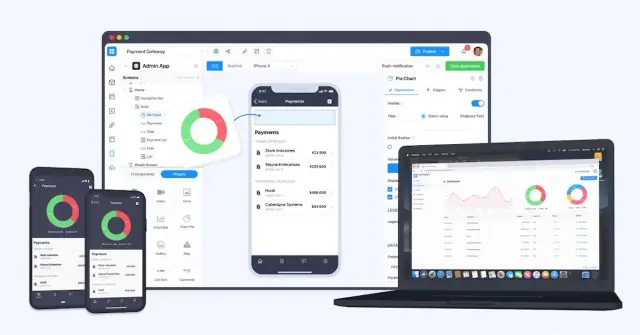OpenAI's Role in Empowering Small App Studios
Discover how OpenAI's advancements in artificial intelligence and machine learning are revolutionizing small app studios, enabling them to thrive in the competitive app market with increased productivity, cost savings, and enhanced creativity.

OpenAI and Its Impact on the Tech Industry
OpenAI is an innovative artificial intelligence research lab aimed at developing and promoting friendly AI and machine learning technologies for the greater good of humanity. This organization focuses on creating cutting-edge advances in the field of AI, revolutionizing the way industries function, and empowering businesses to take advantage of the benefits provided by these technologies. As a result, the tech industry has seen significant growth in the application of AI and machine learning, capable of transforming the way products and services are designed, created, and maintained.
AI-powered solutions have driven increased efficiency, reduced costs, and improved performance in various industries, including software development. Small app studios, in particular, can benefit from the advancements made by OpenAI as they strive to compete and thrive in the highly competitive app market. By leveraging the power of AI technologies, these businesses can access cost savings, improved efficiency, and enhanced innovation in their app development processes.
Unlocking Cost Savings and Efficiency for Small App Studios
One critical challenge small app studios face is keeping production costs low while maintaining high-quality apps. OpenAI's innovative technologies are helping app studios achieve these goals by providing AI-powered solutions that streamline development tasks, reduce time-consuming processes, and mitigate risks associated with technical debt.
For example, an AI-powered translation tool can assist app studios in reducing translation costs and improving the localization process for their apps. Similarly, natural language processing algorithms can help with text and speech recognition capabilities, enabling app studios to expand their app features and reduce manual input tasks.
Furthermore, applying AI and machine learning to the testing and quality assurance stages of app development can result in better, faster results. Small app studios can identify and address potential bugs and glitches by automating these processes before their app reaches the market. This mitigates potential damage to their reputation and the costs associated with fixing issues after the app has been released.
Efficiency is also significantly improved as app development teams can spend less time on repetitive tasks, and more time focusing on app design, functionality, and user experience. With OpenAI's technologies, app studios can optimize resource allocation, prioritizing projects and tasks that contribute to the success and growth of their business.

Driving Innovation in App Design and Functionality
In the app development world, small studios must differentiate themselves from their competition by delivering unique and innovative app experiences to users. OpenAI's advancements in AI and machine learning empower small app studios with the tools and foundation they need to drive innovation in their app designs and functionalities.
AI-powered tools can assist in generating creative and personalized content, allowing for more engaging and tailored user experiences. These tools can also analyze user behavior and preferences, enabling app studios to adapt their apps' design and features according to the demands of their target audience, ensuring long-term app engagement and success.
Moreover, OpenAI's technologies can be employed to devise advanced app features and functionalities, such as context-aware recommendations, predictive analytics, and dynamic content generation. With these capabilities, small app studios can offer users a comprehensive and efficient app experience that caters to evolving user expectations and preferences.
By leveraging AI-driven innovation, small app studios can enhance their competitiveness in the market, providing users with more engaging, effective, and personalized app experiences. This can increase user satisfaction, retention, and revenue generation for these businesses as they continue to flourish in the ever-changing app marketplace.
Enhanced Collaboration through AI-powered Tools
The collaboration between team members is crucial for the success of any app studio, and this is where AI-powered tools based on OpenAI research can play a significant role. Artificial intelligence has the potential to enhance teamwork in several ways, leading to better project outcomes and a stronger competitive edge for small app studios. One of the most significant benefits of AI-powered tools in app development is their ability to facilitate effective communication between team members.
Natural language processing (NLP) algorithms, such as OpenAI's GPT-3, can be utilized for instant translation, enabling team members who speak different languages to work together seamlessly. This ability to break down language barriers can help small app studios form diverse teams with specialized skillsets, driving innovation and improving the quality of their apps.
Similarly, AI can aid in managing collaborative tasks and workflows. Machine learning algorithms can analyze team members' work patterns and habits, generating project management insights and enabling app development studios to optimize their workflows. By effectively allocating resources and streamlining project management processes, AI can help small app studios deliver on time and within budget.
Moreover, AI-powered tools can support the design process and help teams iterate on their ideas faster. For instance, AI-driven design tools can generate multiple iterations of a user interface (UI), enabling designers and engineers to quickly select and refine the best solution. This accelerates the design process and allows small app studios to focus on innovation without getting bogged down in lengthy discussions or design bottlenecks.
Integrating OpenAI Technologies with No-Code Platforms
No-code platforms, such as AppMaster, have become increasingly popular in recent years, due to their ability to accelerate app development and reduce technical debt. These platforms enable users to design and build web, mobile, and backend applications without extensive programming knowledge, significantly lowering barriers to entry for small app studios that may not have access to large development teams.
Integrating OpenAI technologies with no-code platforms can further amplify these benefits, enabling rapid AI-driven app development and providing a sophisticated toolkit for small app studios. OpenAI's machine learning models can be utilized for tasks such as content generation, sentiment analysis, and data-driven decision-making, all of which can be incorporated into no-code app development workflows, making it easier for non-programmers to create feature-rich applications.

One of the ways OpenAI integration with no-code platforms can positively impact development is by offering AI-powered assistance for creating business logic and automating processes within the app. With this functionality, small app studios can develop more advanced and dynamic applications without writing complex code, thus increasing their competitiveness in the market.
Moreover, OpenAI-driven tools can enhance user experience (UX) in applications built on no-code platforms. By leveraging the power of AI for tasks like processing user feedback or understanding customer behavior patterns, app developers can create highly personalized and engaging experiences, leading to higher user satisfaction and increased revenue.
Real-World Success Stories of App Studios Powered by OpenAI
Small app studios that have taken advantage of OpenAI technologies have reaped numerous benefits, such as reduced development time, increased innovation, and improved competitiveness.
- A small e-commerce app studio: A small app developer studio specializing in e-commerce leveraged OpenAI's text summarization technology to enhance its app's functionality. This improved the user experience by providing concise product descriptions and personalized recommendations based on customers' preferences. By integrating OpenAI-driven summarization, the app studio streamlined content management, boosted user engagement, and reported increased sales as a direct result of the enhanced app experience.
- An educational app developer: Another success story involves an educational app developer who employed OpenAI's natural language processing (NLP) capabilities to create an intelligent tutoring system. This app utilized the NLP model to interpret users' questions and provide contextually relevant responses, simulating a conversation with a human tutor. As a result, the app studio saw an impressive uptick in user engagement and received rave reviews for the app's innovative teaching approach.
- A health and fitness app studio: In the health and fitness sector, an app studio used OpenAI's machine learning algorithms to analyze users' exercise data and generate highly personalized workout recommendations. By leveraging the power of AI to create tailored fitness plans, the app studio stood out in the crowded market, resulting in increased user retention and subscription revenues.
These real-world success stories illustrate how small app studios can use OpenAI technologies to their advantage, driving innovation and enabling them to compete effectively in the highly competitive app market.
Evaluating the Future of AI-driven App Development
Integrating OpenAI's technologies and AI-driven tools into the app development process signals a transformation in the industry. This shift presents several opportunities for small app studios and the broader app development and tech sectors. In this section, we will discuss the potential impact of AI-driven app development, addressing the ongoing challenges and emerging trends as they relate to this exciting new frontier.
Streamlining App Creation and Maintenance
As OpenAI continues developing and refining AI models, their ability to understand context, generate code, and interpret business logic will become more sophisticated. This will lead to a more streamlined app creation and maintenance process, reducing the time and effort required to develop and update applications. AI-driven developer tools will help automate repetitive tasks, optimize performance, and minimize errors, allowing developers to focus on higher-value work and enhancing the app's features.
In conjunction with AI-driven tools, no-code platforms like AppMaster will continue to expand and improve, offering a powerful combination of rapid app development and reduced technical debt for small app studios. The synergy between AI and no-code development empowers even non-technical individuals to create powerful, scalable software solutions that cater to growing market demands.
Innovative App Designs and Functionality
With AI-driven app development, the innovation potential is vast. OpenAI's advancements in machine learning and deep learning algorithms can be leveraged to create unique and engaging app experiences. This includes the development of smart assistants, conversational interfaces, advanced analytics, and personalized recommendations.
Moreover, AI technologies open the door to dynamic content generation and design automation. By tapping into these capabilities, small app studios can develop apps that automatically adapt to user preferences, context, and behavior, fostering deeply personalized experiences and a stronger connection to the end-users.
Lower Costs and Competitive Advantage
As AI-driven app development becomes more accessible, development costs will likely decrease. In this environment, small app studios that adopt these advanced technologies will have a competitive advantage over those relying solely on traditional development methods. Early adoption can help streamline development, reduce costs, and further empower small app studios to compete effectively in the market.
At the same time, the demand for AI expertise in app development will grow, resulting in various roles emerging to support these new processes, such as AI architects, data scientists, and AI ethicists. This will create new opportunities for job growth and education to meet the rising demand for skilled AI professionals.
Addressing Ongoing Challenges and Ethical Considerations
While AI-driven app development presents countless opportunities, addressing and overcoming its associated challenges is crucial. These challenges include initial investment in AI-powered tools, ensuring data privacy and security, and ethical considerations regarding AI usage. Concerning data privacy, app studios must ensure compliance with relevant regulations such as GDPR and CCPA. This involves incorporating transparent policies regarding data collection, storage, usage, and transfer in AI-driven apps.
As AI technologies evolve, ethical concerns should be considered and addressed proactively. Ensuring transparency, fairness, and accountability in AI-driven app development will help minimize potential biases and discrimination while maximizing trust in these new technologies.
Conclusion
The future of AI-driven app development is set to revolutionize the industry, offering many benefits to small app studios. As OpenAI's innovations continue to advance, these organizations will experience streamlined app creation, increased innovation, cost reductions, and heightened competitiveness in the market.
Still, challenges must be acknowledged and addressed, with small app studios investing in AI-powered tools, tackling data privacy issues, and responsibly navigating ethical considerations.If these hurdles are overcome, the app development industry will undoubtedly thrive, and small app studios that embrace AI-driven development will play a critical role in driving the industry forward.
FAQ
OpenAI is an artificial intelligence research lab dedicated to creating and promoting friendly AI for the benefit of humanity. Their research and advancements in machine learning technologies are shaping the tech industry, including app development.
OpenAI's technology helps small app studios unlock cost savings, improve efficiency, enhance app design, and innovate new functionalities. It empowers them to compete in the market by reducing development time, enabling better collaboration, and offering AI-powered tools.
Integrating OpenAI technologies with no-code platforms like AppMaster allows for rapid app development, reduced technical debt, and improved collaboration. This provides small app studios with a cost-effective and productive development environment.
An example of a success story would be a small app studio that leverages OpenAI technologies for efficient content generation, improved app functionality, and faster time-to-market, leading to increased user engagement and revenue.
AI-driven app development is likely to streamline the app creation process, encourage innovative designs and functionalities, and reduce costs. It will enable small app studios to compete effectively in the market and develop groundbreaking apps for various industries.
Challenges include the initial investment in AI-powered tools, data privacy concerns, ethical considerations, and ensuring employees have the skills and knowledge to maximize the potential impact of these technologies on app development processes.





